#language stuff
Explore tagged Tumblr posts
Text
my favorite thing right now is how mad the official french language people are that parts of african languages are getting mixed into french
6K notes
·
View notes
Text
Do you ever just get so deep into your inner self that you Forget To English?
The sheer number of times I've almost growled at someone instead of saying "hello" is rising by the day.
564 notes
·
View notes
Text
I wish people would stop saying "women and people with uteruses/vaginas" when talking about an issue that impacts uteruses or vaginas. Simply "people with uteruses/vaginas" works. When you say women AND another group, you imply that all women have the trait. Women without uteruses/vaginas exist, like some trans women and some intersex women and some cis perisex women who've had medical procedures and more.
478 notes
·
View notes
Text
I will forever appreciate a theme in my fictional stories, & that’s exactly what Wind Breaker (by Nii Satoru) has, so, I present:
Wind Breaker characters have a theme to their names.. a thread:
Bōfūrin / 防風鈴
so, even though our protag group’s name is written and visually represented as “wind chime”, Bōfūrin’s name is where this group’s theme of trees/plants start:
防風鈴 (“prevent/protect” “wind chime”) has the same reading as 防風林, a type of forest planted strategically to prevent wind erosion of soil — much like Fūrin’s mission of protecting and serving their town

all of Bōfūrin’s named members (and close associations) so far have some element of tree/plant/wood in their last name (if you look at the kanji of their last names, you’d see a lot of wood radicals/木字旁):
桜 遥 • Sakura Haruka: 桜 / cherry tree
(fun fact: his name 遥 / haruka means "far"; also it's commonly a feminine given name)


蘇枋 隼飛 • Suō Hayato: 枋 / sandalwood (?) or tree used as timber, general term for wooden beams in houses
(fun fact: his last name 苏枋 is the Chinese name of a traditional reddish brown color, named after a pigment made from 苏木!)



楡井 秋彦 • Nirei Akihiko: 楡 / Siberian elm


杉下 京太郎 • Sugishita Kyōtarō: 杉 / Japanese cedar (cryptomeria japonica)


柊 登馬 • Hiiragi Tōma: 柊 / holly osmanthus (osmanthus heterophyllus)
(fun fact: his name 登馬 means "to mount a horse"; no, not that kind of mount, the regular horseback riding kind)

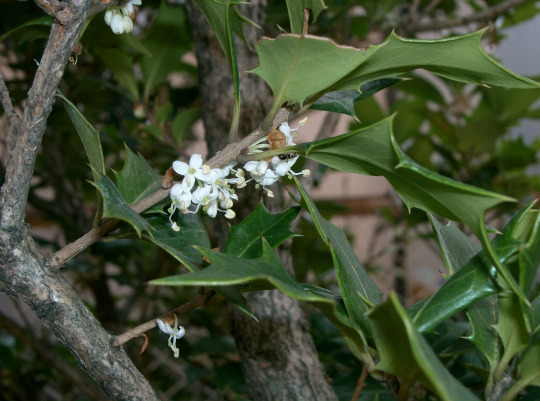
梅宮 一 • Umemiya Hajime: 梅 / plum tree
(fun fact: his name 一 is just "one")


This association also extends to Kotoha, who is very closely associated with Bōfūrin:
橘 琴叶 • Tachibana Kotoha: 橘 / orange tree


now, Bōfūrin members yet to be featured in the show: (spoilers below the break)
(if you want to go to later parts: part 2 - shishitoren & part 3 - noroshi!)
梶 蓮 • Kaji Ren: 梶 / paper mulberry (broussonetia papyrifera)
(fun fact: his name 蓮 / Ren means "lotus")

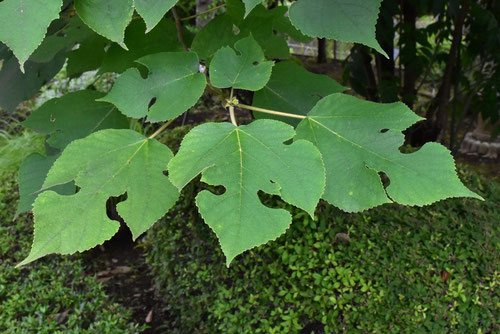
椿野 佑 • Tsubakino Tasuku: 椿 / Japanese camellia
(fun fact: their name 佑 means "to help/protect" or "to bless"!)


桐生 三輝 • Kiryū Mitsuki: 桐 / empress tree (paulownia tomentosa)


柘浦 大河 • Tsugeura Taiga: 柘 / mandarin melon berry (maclura tricuspidata)


There's also 桃瀬 匠 (Momose Takumi, "peach tree") & 水木 聡久 (Mizuki Saku, "wood"), the two other Heavenly Kings
I hope I have rly driven the point home here,, /lh
#wind breaker#wind breaker nii satoru#wind breaker anime#wind breaker manga#bofurin#sakura haruka#suo hayato#nirei akihiko#sugishita kyotaro#haruka sakura#hayato suo#kyotaro sugishita#hiiragi toma#toma hiiragi#umemiya hajime#hajime umemiya#kotoha tachibana#tachibana kotoha#kaji ren#ren kaji#tsubakino tasuku#tasuku tsubakino#kiryu mitsuki#mitsuki kiryu#tsugeura taiga#taiga tsugeura#language stuff#japanese language#wind breaker deepdive#yovo yaps
866 notes
·
View notes
Text
The Ancient Greek word for ship was ναῦς. The word is borderline obsolete in Modern Greek, except the majority of seafaring terms actually derive from it.
For example,
ναύτης (náftis) = sailor
ναυτικό (naftikó) = navy <- that’s where the English word originates too
ναυπηγείο (nafpiyío) = shipyard
ναύλα (návla) = ticket for a mode of transportation, especially ships
The common Modern Greek terms for ship are πλοίο (plío) and καράβι (karávi).
Πλοίο comes from the verb πλέω (pléo) which means “float and sail” and it is also etymologically Greek.
I mostly make this post for καράβι which I was convinced to this day that it was a loanword, perhaps from Turkish or Latin.
Today I learned that καράβι too is etymologically Greek, from Koine Greek καράβιον (karávion), from Ancient Greek κάραβος (kárabhos) which meant “prawn”.
A little stupid of me because even the modern Greek word for prawn is καραβίς (karavís) or more commonly now καραβίδα (karavíða) but somehow I never made the connection.
So once again Greeks had the exact word for ship but at some point in time they went nah fook that from now on we gonna call ships
✨Prawn-ions✨
#greece#Greek#Greek language#languages#language stuff#linguistics#langblr#modern Greek#Ancient Greek#funny#Greek culture
328 notes
·
View notes
Text
Cybertronian names and vocalizations headcanons:
It's not hard to figure out that, upon encounter with humans, cybertronians had to adapt their speech for us to be able to understand them. They also had to translate their names and give them vocalization patterns that otherwise could be not understandable or replicable by humans. Now, let's take a step back and try to figure out how cybertronians would communicate vocally between one another:
Their speech patterns would consist mainly of mechanical noises, such as engine whirring, screeches, clanking, chirping, popping, hissing, and many more. You can refer to this article for a more detailed list of noises.
These sounds don't come just from their mouths (or intakes if you want to use the correct cybertronian term), but their whole bodies, as their many different mechanical components are an integral part of this array of noises. Humans do communicate through body language, but we don't look at someone cracking their knuckles or popping their elbow and go "understandable, have a great day". To us, these noises mean nothing. To cybertronians, they constitute an integral part of communication. However, no cybertronian would be able to assign a meaning to the noise of a human joint popping, simply because that very peculiar noise does not exist in cybertronian language.
This said, cybertronians hence communicate with vast vocalizations coming from their whole bodies. And they can mix them, too. A whir and a clicking sound separately mean two different things, together they have a whole new meaning that might be an entire phrase. This process is similar to some human languages too. For example, linguists out there come help me, in Japanese the word for teacher "先生" is composed of two kanjis that, alone, have two different meanings: "先" meaning "previous" and "生" meaning "life". HOWEVER, in this case the two noises are replicated one after another.
In Cybertronian language, 3 different things can happen: - 2 sounds are made separately, they mean two separate things; - 2 sounds are made one after another, they constitute a phrase; - 2 sounds are made at the same time and overlap, they now compose one new unique sound that means something else entirely.
Of course, humans are only able to make one sound at a time, so replicating the overlapping sounds is impossible. For this reason, cybertronians must find a way to convey complex meanings in their language in a way that is possible for humans to comprehend. Most importantly, they need to translate their names in human language, closely enough that the original meaning isn't lost.
This magnificent post here explained how this process might occur, and offered a unique way to convey meaning into cybertronian names.
I might make another post on how cybertronian names are born, but that's a talk for another time.
For now, let's focus on the NAME STRUCTURE.
Starscream, for example. Again, refer to the aforementioned post. His name roughly translates to "he who screams in defiance of death". Another possibile translation could be "he who screams (at the stars) in defiance of death". Now we might be overcomplicating things, but imagine if there's a particular verb in cybertronian language that precisely refers to screaming as in "screaming to the sky/stars". Imagine Starscream's name contains that verb.
Do you follow? Good, let's overcomplicate it further. "Death" in cybertronian language might be one of those words whose sound can be used in overlap with other words, is often used alone due to its importance. The noun for death is, however, used in overlap with adjectives / verbs. If we keep following that logic, we can conclude that Starscream's name is composed of two consecutive sounds, one meaning "screaming to the stars" (one sound) and another being "in defiance of death / death being defied" (two overlapping sounds, coming out as one). Okay, the hard part is out. If you've kept up until now, you'll have no issues understanding the rest.
How would cybertronians be able to translate this complex name? They have no choice but to butcher it a bit, and since "death screamer" or "death defier" don't sound appealing, they chose to cut off the death part completely and keep the verb with its extended meaning "screaming to the stars". Ladies and gents and everyone in between, that's how "Starscream" is born.
The name phonetics are kept as closely accurate to the original sound as possible.
There are, thank Primus, names that don't contain overlapping noises and can be somewhat pronounced by humans. However, keep in mind that Cybertronian is a very sound-oriented language much like Chinese or Arab. Your vocalization must be precise or else it might take on a whole new meaning.
For example, let's imagine "Tarn" is pronounced with a single noise, or two or more consequential noises, that sound simple enough to the human ear. Phonetically speaking, it'd come out as: - the sound of engines turning on; - a very loud and grating revving noise; - and finally the natural noise of engines stopping. It'd come out as "T-rrrrrrrrrrr-nh". It is pronounceable by humans precisely? Hell no, but you might be able to come close with a throaty sound and a rolling R. If the noise you just made is close enough to get a phonetical pass, congrats! You can now speak 0.0000000000001% Cybertronian. Don't do that in front of the decepticon fanatic though, he might not appreciate anyway.
Cybertronian language rarely contains vowels. Cybertronians on earth have adapted their names to contain vowels and make the sound more comprehensible (See the noise for "Tarn" not containing the "a").
A bunch on examples on how Cybertronian names might sound:
Megatron: Two revving noises (Me + Ga), only distinguishable by cybertronians, followed by a strong rrrrrrrrrrrr sound.
Arcee: A softer rrr sound, followed by chirping and shirieking overlapping noises, making up a "cee".
Bumblebee: The "bumble" part might be two consequential popping sounds.
#transformers#transformers headcanons#fic ideas#maccadam#starscream#megatron#bumblebee#arcee#tf tarn#tf starscream#language stuff#this post took the life out of me#cybertronians#cybertronian language#is a nightmare#blip blip reeeeeeeeevvvvv#shoutout to my bf for teaching me Japanese words
129 notes
·
View notes
Text
it’s so painful to study another language when there isn’t a lot of content available in your country. what was the internet even made for, if not to share knowledge across borders? here i am, stuck watching dubbed american tv shows, when there is a whole world of native german shows that will never reach my screen.
#foreign languages#language stuff#languages#language#language learning#langblr#language learning struggles#german#deutsch#deutsch lernen#german learning#learning german
114 notes
·
View notes
Text
the cruelest thing about the world is that there's so many languages and a girl can't learn all of them
#legit have like 5 things open at once and i'm losing my mind#slovenian and english are locked down#german is far enough to function in so that's fine#but then i have a 50 day streak of swedish (cause it's my fav country to visit)#and i've done like three monthly spurts of russian (cause it sounds so pretty and also slavic so it's not that hard)#and i've done asl for years and love it more than anything#and i fully plan to start in-person classes for slovenian sign (so it'll actually be useful here and great if i come across deaf patients)#anyways. having a good one#my brain is screaming to stop and do one at a time but i don't have the discipline for that#noodle rambles#language stuff#langblr
242 notes
·
View notes
Text
About the ~ている form
If you’re familiar with Japanese, you may have noticed some expressions like “分かっている” (wakatte iru) and “知っている” (shitte iru), which roughly translate into English as “I understand” and “I know”, but literally mean “I’m understanding” and “I’m knowing” – which would sound very strange in English.
In Japanese, several verbs use the continuous form ~ている to express states or conditions, whereas in English, we use the simple present tense. Other examples include:
English: I have money.
Japanese: お金を持っている (okane o motte iru, literally “I’m having money”).
English: I live in Tokyo.
Japanese: 東京に住んでいる (Tokyo ni sunde iru, literally “I’m living in Tokyo”).
This happens because, in Japanese, states and conditions are often viewed as ongoing processes. The ~ている form conveys a sense of continuity or ongoing existence. For example, when someone says 知っている (shitte iru), it reflects that the state of knowing persists over time. Similarly, 持っている (motte iru) indicates that the state of possession of something is ongoing. In contrast, English typically uses the simple present tense to describe states and conditions because it views them as static or general truths. For example, "I know" or "I have got" are seen as stable states rather than ongoing processes.
Furthermore, Japanese places more emphasis on the duration or the current state of an action. The ~ている form explicitly marks this, making it clear that the state is not a one-time event but something that persists over time. On the other hand, English often uses separate words or relies on context to convey aspectual differences.
To make this clearer, consider these examples:
知る (shiru) means "to come to know" (a moment of realization).
知っている (shitte iru) means "to know" (continuously being in the state of knowing).
覚える (oboeru) means “to memorize” (a moment of committing to memory).
覚えている (oboete iru) means “to remember” (continuously being in the state of having memorized).
In some contexts, the ~ている form can be somewhat similar to the English present perfect tense ("have -ed"), as both can describe a state resulting from a past action. For example, the Japanese “鍵を見つけている” (kagi o mitsukete iru) translates to the English “I have found the key,” as it indicates that the key was found in the past, and the result of having found it is still relevant now. However, we must keep in mind that ~ている can indicate both an ongoing action and a state resulting from a past action, whereas the English present perfect tense primarily indicates a state resulting from a past action.
In conclusion, we can say that Japanese has developed a nuanced system of aspect marking that emphasizes the continuity of states and actions. In contrast, English, with its different linguistic evolution, does not always mark aspect as explicitly, especially in the simple present tense. The use of ~ている in Japanese reflects a focus on ongoing processes, while English tends to describe states as static truths using the simple present tense. This difference highlights the broader linguistic principle that languages can vary significantly in how they encode meaning and conceptualize the world.
234 notes
·
View notes
Text
Interior Department Announces New Guidance to Honor and Elevate Hawaiian Language

"In commemoration of Mahina ʻŌlelo Hawaiʻi, or Hawaiian Language Month, and in recognition of its unique relationship with the Native Hawaiian Community, the Department of the Interior today announced new guidance on the use of the Hawaiian language.
A comprehensive new Departmental Manual chapter underscores the Department’s commitment to further integrating Indigenous Knowledge and cultural practices into conservation stewardship.
“Prioritizing the preservation of the Hawaiian language and culture and elevating Indigenous Knowledge is central to the Biden-Harris administration's work to meet the unique needs of the Native Hawaiian Community,” said Secretary Deb Haaland. “As we deploy historic resources to Hawaiʻi from President Biden’s Investing in America agenda, the Interior Department is committed to ensuring our internal policies and communications use accurate language and data."
Department bureaus and offices that engage in communication with the Native Hawaiian Community or produce documentation addressing places, resources, actions or interests in Hawaiʻi will use the new guidance on ‘ōlelo Hawaiʻi (Hawaiian language) for various identifications and references, including flora and fauna, cultural sites, geographic place names, and government units within the state. The guidance recognizes the evolving nature of ‘ōlelo Hawaiʻi and acknowledges the absence of a single authoritative source. While the Hawaiian Dictionary (Pukui & Elbert 2003) is designated as the baseline standard for non-geographic words and place names, Department bureaus and offices are encouraged to consult other standard works, as well as the Board on Geographic Names database.
Developed collaboratively and informed by ʻōlelo Hawaiʻi practitioners, instructors and advocates, the new guidance emerged from virtual consultation sessions and public comment in 2023 with the Native Hawaiian Community.
The new guidance aligns with the Biden-Harris administration’s commitment to strengthening relationships with the Native Hawaiian Community through efforts such as the Kapapahuliau Climate Resilience Program and Hawaiian Forest Bird Keystone Initiative. During her trip to Hawaiʻi in June, Secretary Haaland emphasized recognizing and including Indigenous Knowledge, promoting co-stewardship, protecting sacred sites, and recommitting to meaningful and robust consultation with the Native Hawaiian Community."
-via US Department of the Interior press release, February 1, 2024
--
Note: I'm an editor so I have no idea whether this comes off like as big a deal as it potentially is. But it is potentially going to establish and massively accelerate the adoption of correctly written Native Hawaiian language, as determined by Native Hawaiians.
Basically US government communications, documentations, and "style guides" (sets of rules to follow about how to write/format/publish something, etc.) can be incredibly influential, especially for topics where there isn't much other official guidance. This rule means that all government documents that mention Hawai'i, places in Hawai'i, Hawaiian plants and animals, etc. will have to be written the way Native Hawaiians say it should be written, and the correct way of writing Hawaiian conveys a lot more information about how the words are pronounced, too, which could spread correct pronunciations more widely.
It also means that, as far as the US government is concerned, this is The Correct Way to Write the Hawaiian Language. Which, as an editor who just read the guidance document, is super important. That's because you need the 'okina (' in words) and kahakō in order to tell apart sizeable sets of different words, because Hawaiian uses so many fewer consonants, they need more of other types of different sounds.
And the US government official policy on how to write Hawaiian is exactly what editors, publishers, newspapers, and magazines are going to look at, sooner or later, because it's what style guides are looking at. Style guides are the official various sets of rules that books/publications follow; they're also incredibly detailed - the one used for almost all book publishing, for example, the Chicago Manual of Style (CMoS), is over a thousand pages long.
One of the things that CMoS does is tell you the basic rules of and what specialist further sources they think you should use for writing different languages. They have a whole chapter dedicated to this. It's not that impressive on non-European languages yet, but we're due for a new edition (the 18th) of CMoS in the next oh two to four years, probably? Actually numbering wise they'd be due for one this year, except presumably they would've announced it by now if that was the case.
I'm expecting one of the biggest revisions to the 18th edition to add much more comprehensive guidance on non-Western languages. Considering how far we've come since 2017, when the last one was released, I'll be judging the shit out of them if they do otherwise. (And CMoS actually keep with the times decently enough.)
Which means, as long as there's at least a year or two for these new rules/spellings/orthographies to establish themselves before the next edition comes out, it's likely that just about every (legit) publisher will start using the new rules/spellings/orthographies.
And of course, it would expand much further from there.
#don't ask me about the magazine and newspaper half of this#bc I do Not know AP style#except the differences I'm annoyed at lol#ap doesn't respect the oxford comma#hawaii#hawaiʻi#language#orthography#linguistics#language stuff#hawaiian#native hawaiian#united states#publishing#book publishing#indigenous#indigineous people#indigenous languages#language revitalization#language resources#editorial
421 notes
·
View notes
Note
the sitelen pona symbol for the word "nena"

✅️ featherless
❎️ at first glance I wasn't sure if the shape evokes singular or plural leg imagery so I brought this case to our in-house language specialist. According to him, "nena" translates to "hill" and other similar phenomena, which brings to mind less so two legs paired together and rather one leg in a bent-knee position. As such, we will be categorising this abstract language character as containing only one leg
Now I wanna learn toki pona
#Now kama on the other hand? that's a real man#Not a man#linguistics#languages#language stuff#lingblr#Sitelen pona#toki pona
112 notes
·
View notes
Text
We ask your questions so you don’t have to! Submit your questions to have them posted anonymously as polls.
#polls#incognito polls#anonymous#tumblr polls#tumblr users#questions#polls about language#submitted nov 28#formal speech#language#linguistics#language stuff
360 notes
·
View notes
Text
PARSELSCRIPT!!
Hi. This is mostly for the people from Discord but tadah! I'm finally making that Tumblr post I've been talking about for months.
(Warning this will probably be very chaotic)
To anyone new who sees this: me and some friends made an alphabet for Parseltongue from Harry Potter, aka Parselscript. I'll take you on a little journey to explain my process and give you some tips, should you want to start writing it.
Disclaimer: I wanted to make this script usable for the writer I made it for so it's less of an actual language and more just some characters to represent the Latin (or ‘English’) letters. Like a cipher. It is not realistic. If I made this realistic I'd have to add all sorts of things to indicate body language and smell etc and also have to figure out what sounds Parseltongue actually has etcetera etcetera. No.
Alright.
It all started when we started talking about Parselscript in a Discord server and I asked my friend Ava to visualise the script because she seemed to have a clear vision of it, so I could use it to go from there.
That's how we got this.
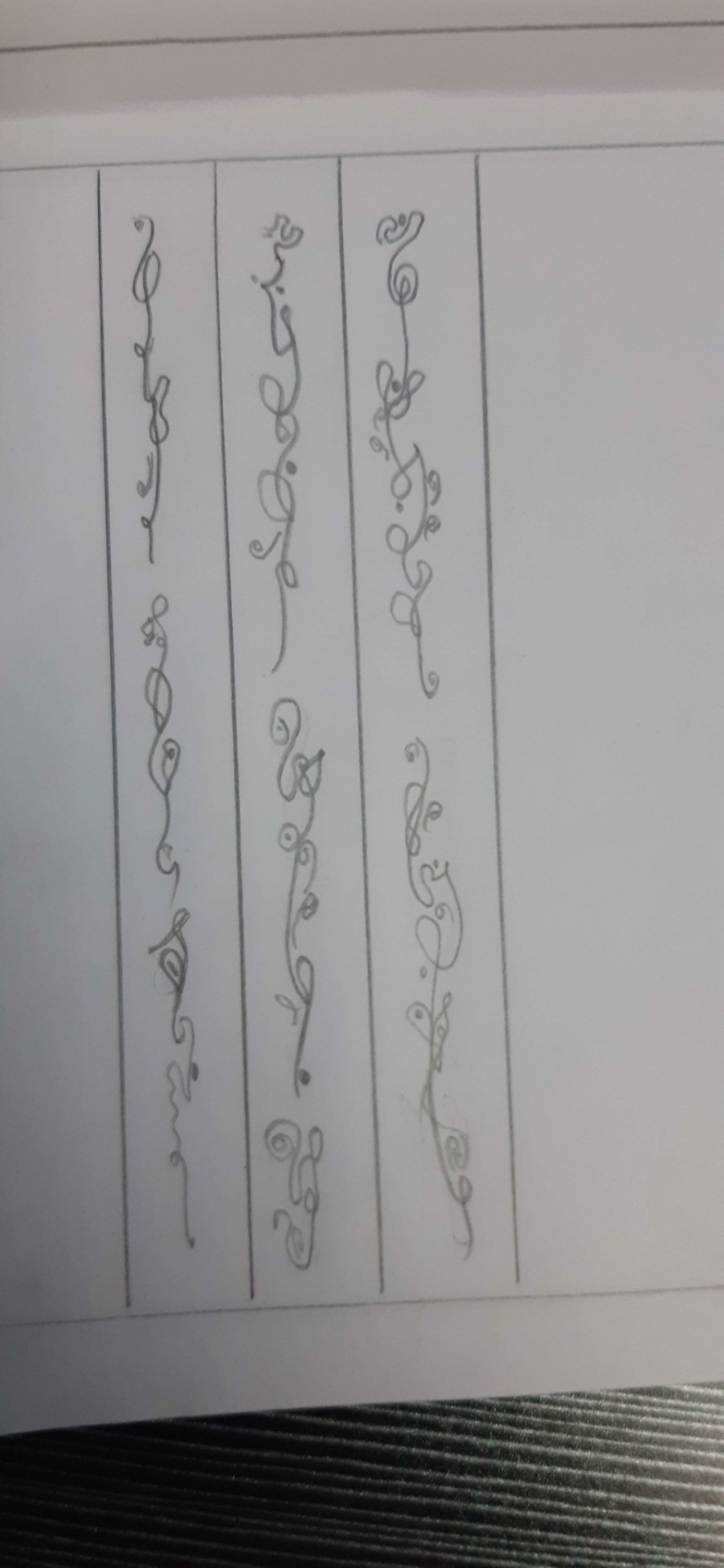
I think we all wanted to go with something flowery for some reason, so we did.
After this I just messed around with brushes and shapes in Procreate for a while, tweaking things and trying to make it more writeable. I ended up with something like this (still a rough draft).
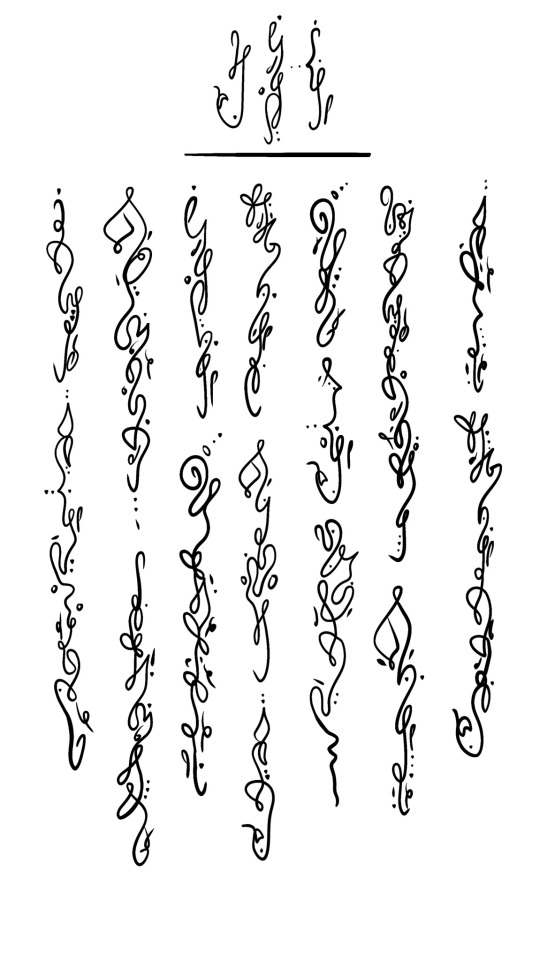
It may look a bit like random squiggles at first, and it kinda was at this point. As you can see there's also a lot of added dots and lines, which can be a bit hard to remember and I see you wondering what it looks like without them.
Well here it is.
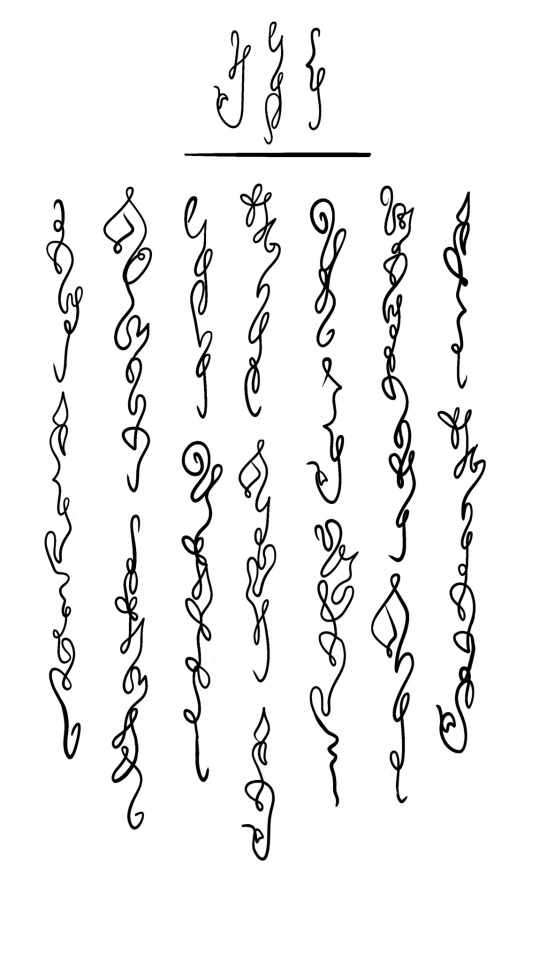
I showed this to the people I brainstormed with in Discord and we decided to go with the more complicated version because it looks better lol.
This is one of the final versions.
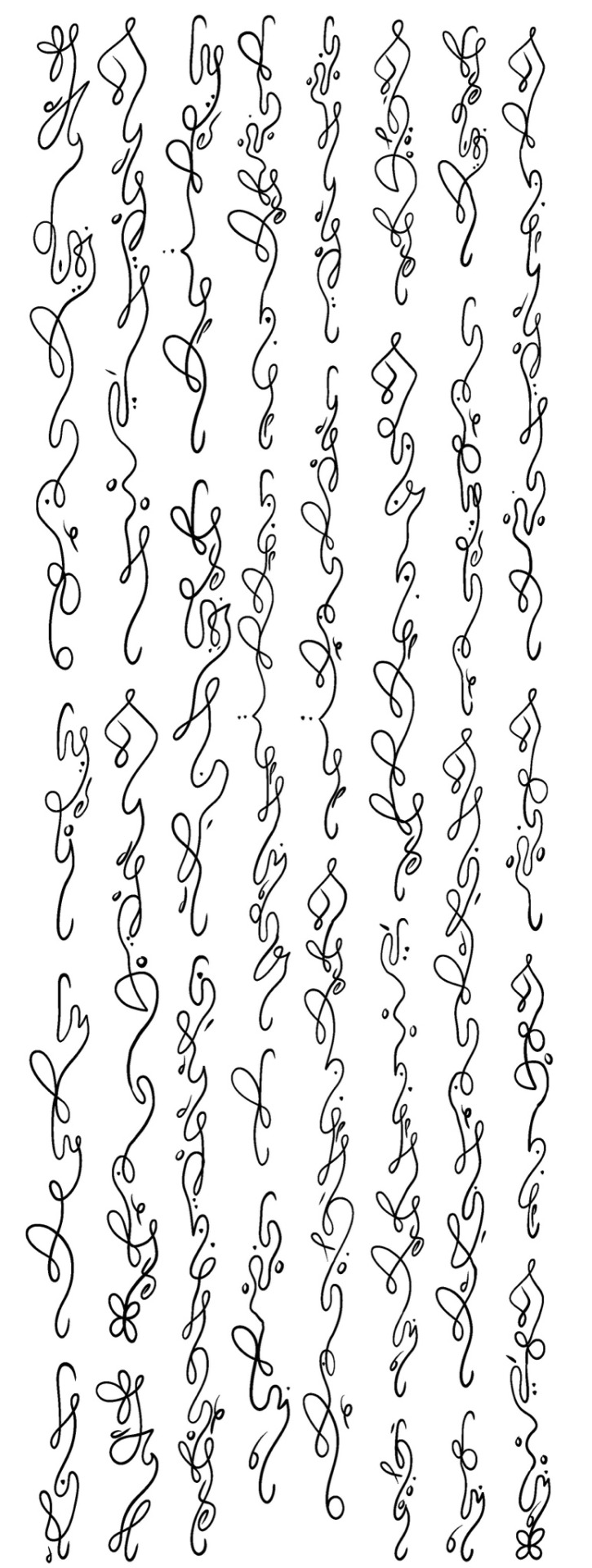
It says: "Hello, my name is Kiwi Cult. I made this script after reading a fanfic called Terrible, But Great written by Isalise the loml on Archive Of Our Own."
Now, to talk about some of the (boring) logistics.
It is read from left to right, top to bottom.
Every separate combination of squiggles you see above is a separate word. Every word is made up of a starting character, one or more letter characters and an ending character.
The very first character you see in the top left corner, with the three petal looking thingies, is a silent starting character that indicates the start of a sentence. Not word: sentence. The end of the character, that little circle thingy, is a comma. So, the first combination says: "Hello,".
Then, the second combination starts with a kind of hook going down and right. This is also a silent character and more meant as an interpunction, that's why you don't pronounce it. It's kind of just a way to start the word when there isn't anything special about it (aka it's not the start of a sentence, a name, an exclamation or a question. But every character is special in its own right🥲). The same kind of hook can be found at the bottom of the combination, except going up. It has the same use, basically just a way to end the word when there isn't anything special about it. Now, you might ask: why does it go right and not left?
We talked about this a while, because I wanted the direction to have some kind of meaning. We wondered about gender, tone, blah blah all kinds of complicated things but in the end I just wanted this script to be writable so I chose to have proficient writers in Parseltongue make their hooks go left and beginners have their hooks go right.
Now, you might notice that I end my words with a hook going right. That is because I don't see myself as a pro in writing in Parselscript okay? It's hard!😭💀
Now, other than the character indicating the start of a sentence, the circle, and the simple hook, there are a few other characters to start or end a combination (don't worry I'll show them all to you at the end, you won't have to use your imagination for long).
We have a character to indicate a name. Now, the rule is: name indicator over start of sentence indicator. So, if you start a sentence with a name, you'll use the symbol to indicate a name, NOT BOTH. (That's not even possible but I don't even want to see you try and butcher my child).
There is a character to indicate a sentence that would usually be followed by an exclamation mark (!), but at the start of the sentence. Then you’d end the exclamated sentence with a period.
The same goes for a question mark (?): put it at the start of a question, not the end. Again, it wouldn't even be possible to use it at the end of a combination but I DON'T EVEN WANNA SEE YOU TRY.
Finally we have a period (.), which looks a bit like a flower with four petals. You do use this one at the end of a word, and it is always followed by a start of sentence indicator or a name indicator. I know people are rejecting capitals these days in their typing but I don't wanna see it. If you start a word after a period with a hook I will find you.
If a sentence starts with a name that is also a question or exclamation you’d use the question/exclamation mark above the name indicator, otherwise it would take away a vital part of the sentence while a name can still be read even if it doesn’t have its indicator.
So, to put it all next to each other, the symbols we have are: -start of sentence indicator -name indicator -exclamation mark (!) -question mark (?) -period (.) -hook (direction depends on efficiency) -comma (,) (direction depends on efficiency)
I didn't make adjusted characters to indicate a capital letter like we do in the Latin alphabet, meaning that the only things you can kind of 'capitalise' are the start of a sentence and the start of a name.
It is also slightly phonetic. Emphasis on slightly. I made separate characters for almost all letters in the Latin alphabet, so you can just write your word normally with Parselscript characters. The only difference is that I made only one character for the 'f/v' sounds and that there is no 'c' character. If a word has a 'c' in it, you'll have to use the character for a 'k' or an 's'. Also a ‘q’ can be made with ‘k’ and ‘w’ etc.
A few examples: -character=karakter -parselscript=parselskript -crazy=krazy -science=siense
-quiz=kwuiz
I know it looks a bit confusing, but I trust you guys' ability to read context clues and figure out what someone means when you try to decipher Parselscript.
Now, for a word like 'phonetic' or 'decipher' I don't really care whether you use the separate characters for 'p' and 'h' or just the one for the 'f/v' sound. You do you.
I also don’t use any double letters because they basically sound the same and it looks ugly but if you want to use double symbols feel free.
I also made some numbers that do not look like they fit with the rest of the script but I promise you that's just because you're not used to it yet. Our own numbers don't belong with our alphabet either because we nicked them from the Arabs (I think, don't quote me on this) but we don’t notice that either.
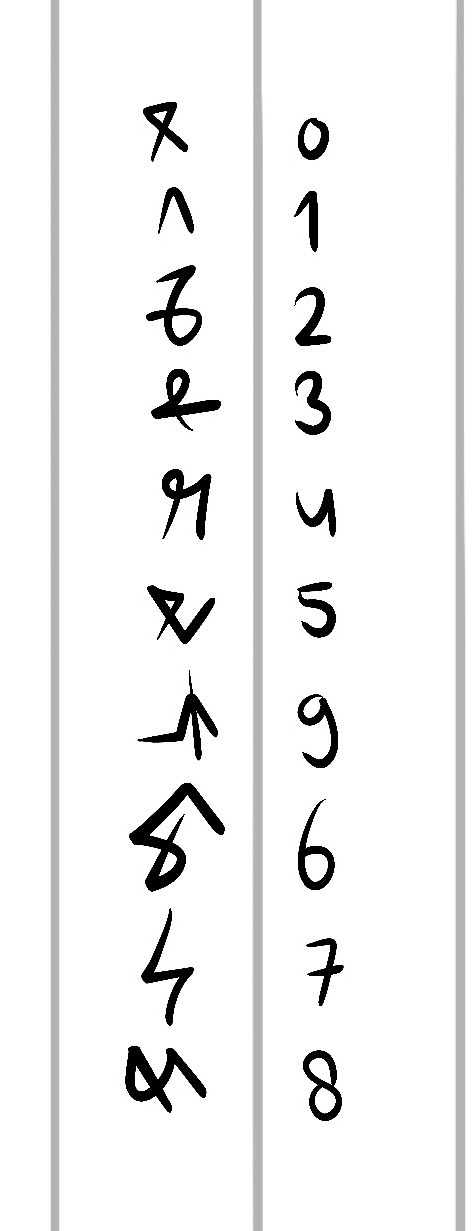
Tadah. (Yes I know it’s out of order I told you this was gonna be chaotic af)
Other than that, feel free to ask me questions if I've forgotten anything or if you're wondering about anything. I can't guarantee that I have a good answer because I might not even have thought about it myself, but I can always try to come up with something. I am one person, I'm afraid I haven't been able to take everything about a script into consideration.
Now, without further ado; here is the key.
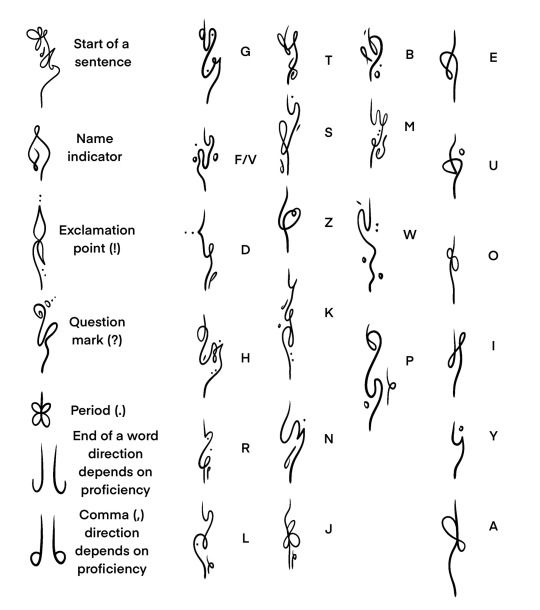
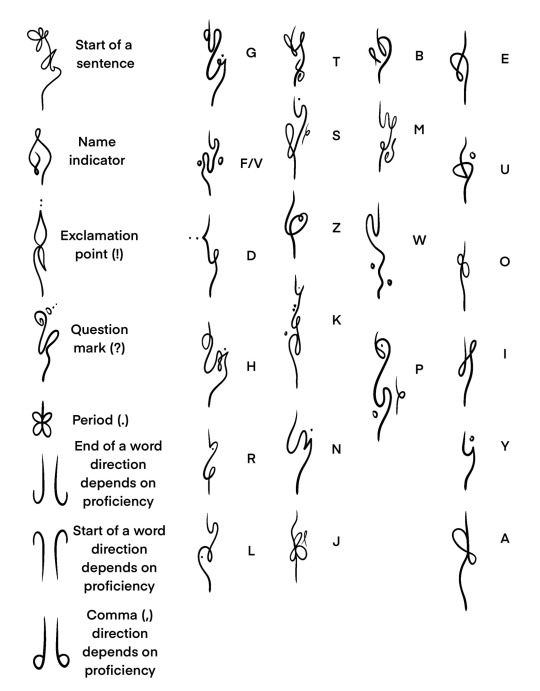
No, your eyes didn't deceive you: there are two versions. The first has a bit more loose squiggles than the second one. I realised that when I was writing physically, the second version was much nicer to write, so it is kind of like Simplified Parselscript. I haven't decided yet if I'm gonna put some lore behind it or not yet. But I included the og one if you're a tryhard and wanna take it on.
Now, if you're gonna start writing it yourself, here is the stroke order.
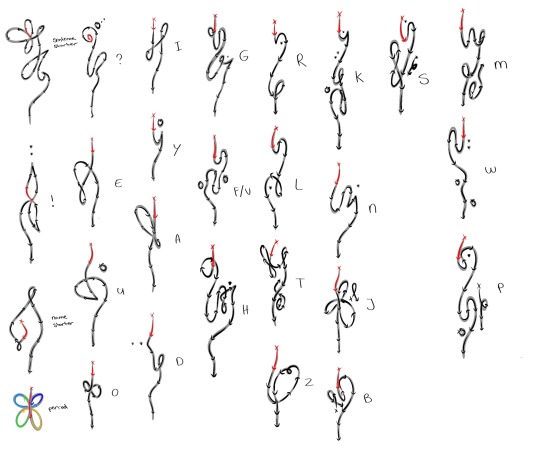
I tried to make it as clear as possible but please ask me if you're confused on anything.
Red is the starting point of the whole symbol, the arrows indicate the direction to go in, x marks the start of the small extra's.
Now, I'd also recommend writing on some type of paper with vertical lines like this if you're gonna do it physically.

You can just turn a paper with normal, horizontal lines a quarter to get vertical lines. Also, do NOT write in between the lines. They are meant to help you keep the start and ending on the same line so you don't start going into crazy directions while writing. So, start your sentence symbol or hook or whatever in the middle of the line and try to keep coming back to that vertical line after every letter. As you gain more proficiency you'll probably go straight into the next letter without going back to the line all the time but I think this is a good starting point.
I also recommend writing with a fountain pen or something else that flows well because it’s easier to write that way.
Here is another rough draft I made on physical paper to get a feel for it. As you can see this draft had a lot more different starting characters and ending characters so just ignore that. Hope this motivates you a bit or smth.
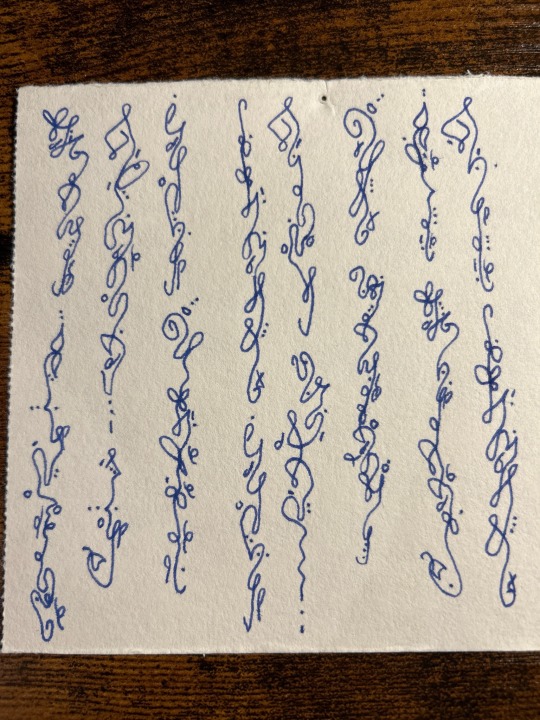
Lmk if you want me to post a video of me writing in this Parselscript.
Also please let me know if you know of someone else who's also made a Parselscript because I tried to look for it on Tumblr and Twitter etc but I couldn't find anything.
I also feel like there’s a big mistake I made that I realised the last time I worked on this script but I’ve forgotten it now so if you find out please comment or dm or anything💀
Also feel free to use in your own fic, tho a little tiny shoutout in the a/n would be nice :) I’m @/kiwi_cult on Ao3, @/slvtr_ on Wattpad, @/kiwi cult on ff.net, @/slvtr.1 on TikTok and @/.slvtr on Discord.
Credits:
@natis-balamnimaja @asterialvia and @/zee (who unfortunately left the server and I don't know the Tumblr @ of) for brainstorming with me and @isalisewrites for inspiring us and making the server we discussed this in.
Okay bye :) tell me if I forgot anything.
🥝
#fanfiction#isalise#parselscript#parseltongue#hogwarts#harry potter#language stuff#alphabet#script#tom riddle#worldbuilding#ao3
251 notes
·
View notes
Text
Gotta love Georgian language because no insult is normal and no expression is boring. My personal favourites include: "Prepare your grave before I get to you", "you're not the belly button of the world", "painting crap gold won't cover its smell", "may you always live in oddly interesting times", "don't kiss so hard you suck out their stomach acid", "either lay an egg or stop fussing", "grinning like a cheese merchant", "a lie always has short legs", "if two know, the pigs know".
#living in oddly interesting times rn and can't say i'm a fan of it#georgia#saqartvelo#sakartvelo#საქართველო#linguistics#linguist humor#language#languages#idioms#language stuff#language study#caucasus#caucasian#eastern europe
55 notes
·
View notes
Text
Wind Breaker characters have a theme to their names, a thread, part 3:
we will discuss Noroshi, a group that appears later in the manga, so, spoilers under the divide, click with discretion!
(part 1: Bōfūrin and part 2: Shishitoren)
Noroshi / 烽

the group antithesis to Bōfūrin is aptly named signal fire. with a fire radical / 火字旁, their name easily invokes the fire imagery that Endō frequently quotes
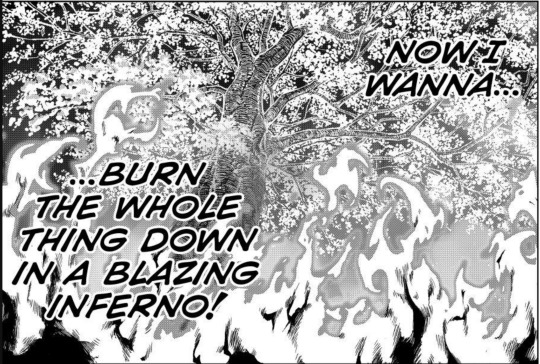
as we have established, Bōfūrin is associated with trees/plants, so it is unsurprising that a group that broke from them and wants to destroy their ideals would want to set fire to them
interestingly enough, the leader of noroshi and his second-in-command (and biggest fan) have both wood and fire in their last names:
焚石 矢 • Takiishi Chika: 焚 / to burn (with fire)
the kanji 焚 is literally made up of 林 (two wood/木 side by side, "forest/trees") on top and 火 ("fire") below it,, very straightforward

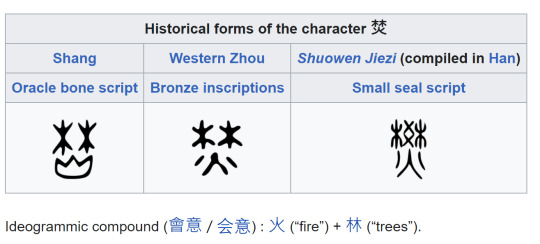
棪堂 哉真斗 • Endō Yamato: 棪 / (archaically) a red fruit of a tree that looks like crabapples
the kanji 棪 is made up of 木 (wood radical) and 炎 (two fire/火 stacked on top of each other, "flames"),, again, very straight(?)forward

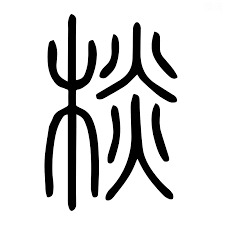
other named members of noroshi:
they have elements of wood in their last names, likely a leftover from their previous association with Fūrin, but they are specifically wooden tools instead of living trees:
盤杖 奏音 · Banjo Kanon: 杖 / (wooden) walking stick
(he looks like scaramouche from genshin i say this and run tf away so fast)

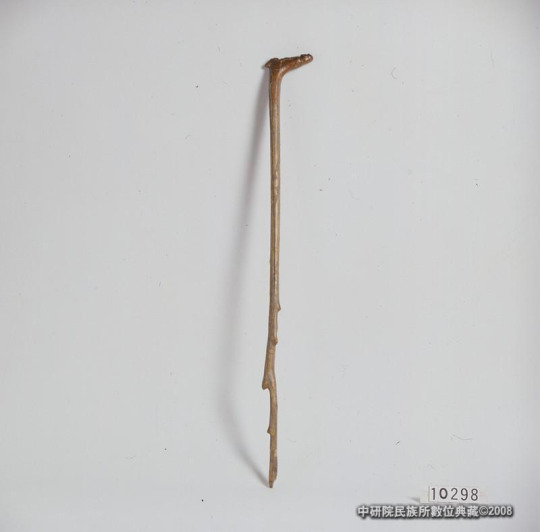
杓子 千宙 · Shakushi Chihiro: 杓 / wooden ladle

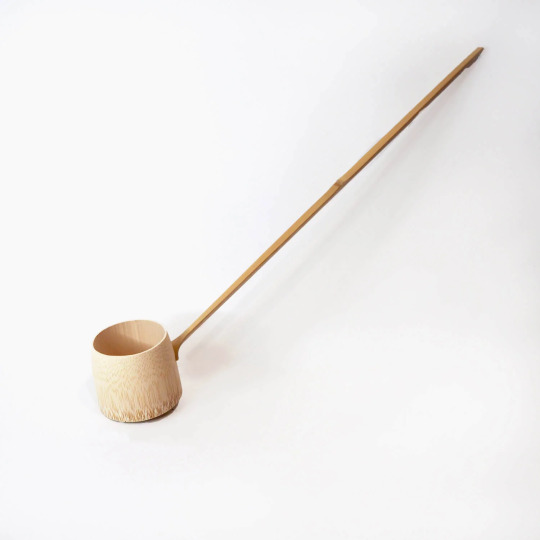
樽味 清太郎 · Tarumi Seitaro: 樽 / wooden barrel (for alcohol/soy sauce, etc.)


柱尾 修士 · Hashirao Shuji: 柱 / (wooden) column, pillar
(yup the same kanji 柱/Hashira that's used in Demon Slayer; also this is why i kept calling the hashiras "pillars" and had to explain myself when talking about KNY with my very confused English-speaking friends)


梳地 弦治 · Sugichi Genji: 梳 / (wooden) comb
(he's weirdly Grease coded makes sense he has "comb" in his last name lmao)

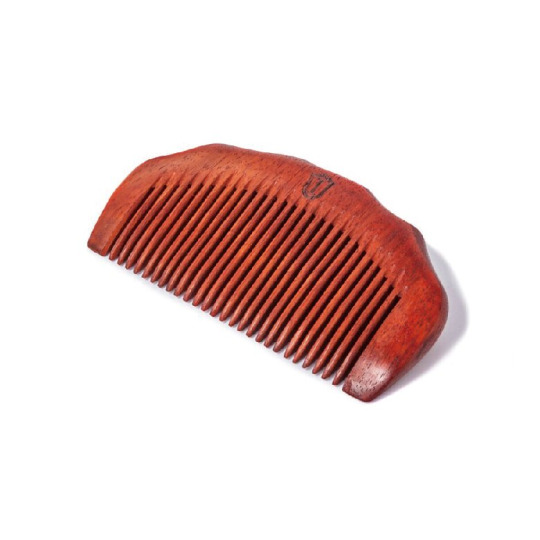

that's what i got so far! hope you found this interesting. ty for reading if you got this far!!
#wind breaker#wind breaker nii satoru#nii satoru#wind breaker manga#noroshi#noroshi wind breaker#endo yamato#takiishi chika#chika takiishi#yamato endo#language stuff#japanese language#wind breaker anime#wind breaker deepdive#yovo yaps#wind breaker spoilers
262 notes
·
View notes
Text
Common Modern Greek phrases with Byzantine origins
"Παίζω στα δάχτυλα" (Pézo sta ðákhtyla) = I am very good at knowing something, I have learned it very well. Literally, I can play (sth) on my fingers. Children in the Eastern Roman Empire learned the basics of arithmetic by counting with their fingers, a practice still used in the old years of the modern Greek school.
"Ο ήλιος βασίλεψε" (O ílios vasílepse) = the sun set, literally "the sun reigned" It might seem counter-intuitive, however in Greek when you say "the sun reigns" or "sun-reigning" (ηλιοβασίλεμα), it is not about the sun being high in the sky but it is instead used for the sunset, the early evening. This is because of the striking colours of the sunset; gold, orange, red, purple - the luxurious colours associated with the Byzantine emperors.
"Ἐφαγα τον περίδρομο" (Éphagha ton períðromo)= I ate too much, I ate everything on sight. Literally, I ate the "peridromos". The peridromos was the edge of a deep bowl in which the Byzantines ate soup, so when they filled their bowl up to the peridromos it meant they were eating a lot. The interesting thing is that the origin of this phrase is very little known to modern Greeks and because peridromos can also have other meanings, there are also other interpretations that however make too little sense (IMO). This alone could perhaps be proof of how the phrase survived organically amongst the people even after the fall of the Byzantine empire (and its bowls).
"Μη με παιδεύεις" (Mi me peðévis) = don't bother / torment / trouble me, etymologically deriving from the word for "child". In Ancient Greek, the child was παις and its derivative verb παιδεύω meant "educate", an action interwined with childhood. Progressively, however, the verb became more and more associated with the pains and struggles of being educated until by Byzantine / Medieval Greek's time it had the meaning of "bother / torment". In Modern Greek the verb παιδεύω has kept the Byzantine meaning of tormenting / bothering but its respective noun παιδεία (peðía) still retains the ancient meaning of education or more accurately the full transformative period of learning in a young person's life. There are however other also ancient derivatives from the same words that are more precisely used for education terminology.
"Ἠμαρτον!" (Ímarton) = an exclamation in the likes of "I have sinned! (Forgive me)") Ancient Greek did not have a word for the sin. The verb αμαρτάνω (amartáno), whose form above is the past tense, meant "I miss the target / I make a mistake". In ancient Greek they would say it for example when an archer did not hit the target. By Byzantine times, however, the word had acquired a more figurative, Christian theological meaning because one's ultimate goal was the virtuous living, so when they did something bad or wrong, it was perceived as "losing sight of their aim, their intent". And that's how the word developed into meaning "sin" in Medieval and Modern Greek.
Source: Byzantinist historian Helene Ahrweiler

#greek#greece#greek language#history#languages#language stuff#linguistics#greek history#byzantine history#eastern roman empire#byzantine empire#greek culture
210 notes
·
View notes